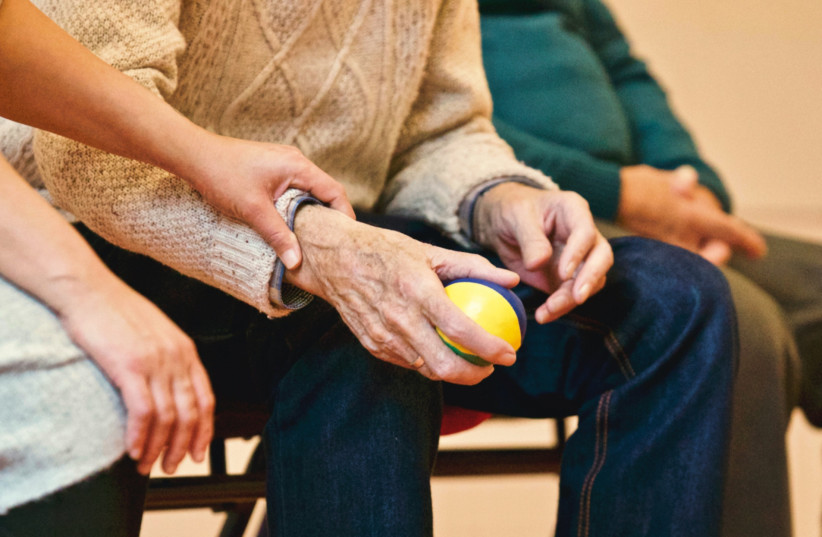Yom Kippur is a day dedicated to spiritual cleansing, the true meaning of the term kapara that is at the heart of the day. Similar to our observance of Shabbat, we refrain from all work; but on this occasion, we neither eat nor drink, and we take multiple measures to distinguish the Day of Atonement from any other day of the year.
Yom Kippur also demands that we place a heavy focus on issues of the relationship between us and our fellow humans, including our relationship with the elderly and infirm, as indeed the very essence of the atonement process cannot succeed without this focus.
As natural and familiar a process as going through the 25 hours of Yom Kippur is for so many, for others the day presents very individual challenges. In particular, I refer to the aging community among us suffering from dementia and severe memory loss, and those who care for them.
For these individuals, even the slightest change in routine can increase their sense of confusion. And while circumstances will arise where they might not be fasting themselves, they are able to detect a change in their day to day routine, or sense an absence of friends and loved ones who are in synagogue or otherwise occupied with the rituals of the day, leading to a sense of instability. It is proper to organize an appropriate experience and accompany them, making sure not to leave them confused or lonely.
Helping those with dementia on Yom Kippur
DEMENTIA CAN sometimes also be accompanied by emotional outbursts triggered by memories or nostalgia that come up around holidays and days of significant tradition like Yom Kippur. When we treat or speak with people with dementia, we need to be ultimately aware of those symptoms of their condition.

The precise definition of the mental and physical condition of a person with dementia is complex and dynamic; therefore, it is recommended to consult with medical professionals and a rabbi before the fast in order to clarify what is permitted and forbidden, as different stages of the condition allow for different leniencies.
The obligations in the rest of the Yom Kippur prohibitions, such as not bathing or wearing leather shoes, are more lenient than the obligation to fast. When it is sufficient to remind those with dementia of the situation, one must remind them and prevent them from transgressing prohibitions. However, when observing these prohibitions becomes burdensome or confuses them, and definitely if they are not aware of the prohibition, one should allow them to act as they can and wish.
It is also well worth remembering that the essence of Yom Kippur as a day where care for the needs of the impoverished goes all the way back to the prophet Isaiah, who said in the words that we read on the day itself: “Is this not the fast I will choose? To undo the fetters of wickedness, to untie the bands of perverseness, and to let out the oppressed free, and all perverseness you shall eliminate. Is it not to share your bread with the hungry, and moaning poor you shall bring home; when you see a naked one, you shall clothe him, and from your flesh you shall not hide?”
We are required to treat the weak and impoverished with kindness and sensitivity and always ask the question of what is the best we can possibly do for them – in this case, for the person with dementia.
If that means compromising slightly on the nature of the day and treating the person as if it were an ordinary day, then that is what is expected of us. If they might prefer being reminded of the melodies and prayers of Yom Kippur of their youth and we know they would benefit from joining us in synagogue, we should make every effort to make that possible. Of course, if they need to eat, then we must allow and assist them to do so as needed. Persons with dementia, as well as any other patient, who routinely takes medication, including sedatives for anti-anxiety, should continue to take the medication on Yom Kippur, even if it seems that they have no direct medical need.
THERE ARE two major benefits of accepting this compassionate approach. Firstly, we will ensure that our loved ones feel at ease and that we are doing what is best for them. But just as importantly, we will be embracing the essence of Yom Kippur by becoming more sensitive and attentive to people and shift our attention away from what might be best for ourselves to the needs of others. In so doing, Yom Kippur and the New Year can be observed with deep meaning in strengthening the importance of caring for those who might not be able to care for themselves. ❖
Rabbi Yuval Cherlow is the Director of the Tzohar Center for Jewish Ethics and a Founder of the Tzohar Rabbinical Organization in Israel. Tzohar’s Through 120 hotline (*9253 from Israeli phones) provides guidance to ethical and halachic dilemmas regarding the physical and mental health treatment course for loved ones.
